
- Retrait gratuit dans votre magasin Club
- 7.000.000 titres dans notre catalogue
- Payer en toute sécurité
- Toujours un magasin près de chez vous
- Retrait gratuit dans votre magasin Club
- 7.000.0000 titres dans notre catalogue
- Payer en toute sécurité
- Toujours un magasin près de chez vous
Strategies for Employee Assistance Programs
The Crucial Balance
William J Sonnenstuhl, Harrison M TriceDescription
This Key Issues report addresses questions often raised by employers and union leaders setting out to develop job-based programs to help alcoholic and other troubled employees.
Following chapters on the historical development and key components of EAPs, the authors discuss the importance of balance in program strategies and in corporate and union responsibilities. The authors also present examples to show the role EAPs might play when the problems of alcoholic and other troubled employees lead to arbitration and workers' compensation cases. The focus in the concluding chapter is on the future of EAPs--the need for more research and further development of educational programs for EAP practitioners.
Spécifications
Parties prenantes
- Auteur(s) :
- Editeur:
Contenu
- Nombre de pages :
- 88
- Langue:
- Anglais
- Collection :
Caractéristiques
- EAN:
- 9780875461670
- Date de parution :
- 30-05-90
- Format:
- Livre broché
- Format numérique:
- Trade paperback (VS)
- Dimensions :
- 216 mm x 279 mm
- Poids :
- 235 g

Les avis
Nous publions uniquement les avis qui respectent les conditions requises. Consultez nos conditions pour les avis.






